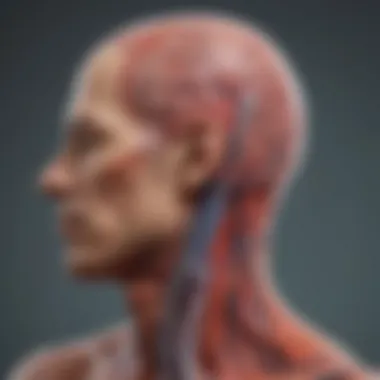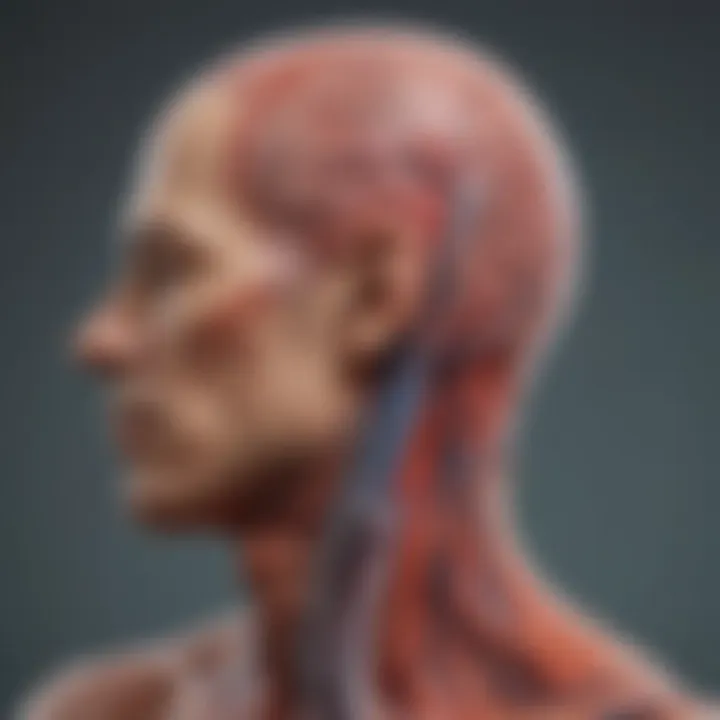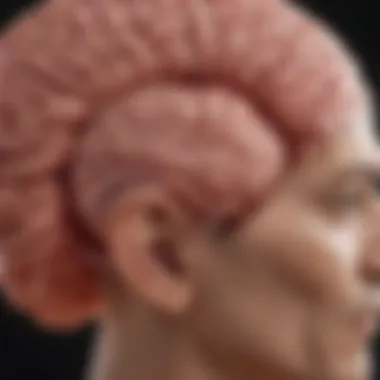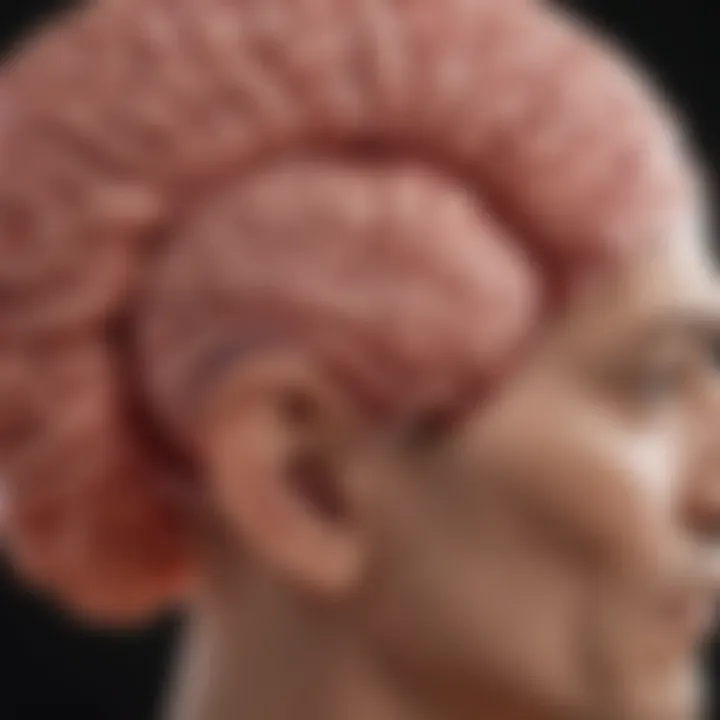Understanding the Link Between High Blood Pressure and Headaches


Intro
High blood pressure, also known as hypertension, affects millions globally. It is a significant health concern due to its association with various complications. One frequently reported symptom among individuals suffering from hypertension is headaches. Understanding this link is critical for effective management and treatment.
Recognizing high blood pressure as a potential cause of headaches can change how individuals approach pain management. The implications stretch beyond simple pain relief, influencing overall health strategies.
This article analyzes the physiological mechanisms that explain this relationship, outlines preventative measures, and suggests lifestyle changes that may alleviate both hypertension and headaches. By providing a comprehensive overview of this topic, we aim to facilitate better health outcomes for those affected.
Understanding High Blood Pressure
High blood pressure, or hypertension, is a critical health concern that can lead to severe medical complications. Understanding its implications is crucial for both patients and healthcare providers. This section dissects the fundamental aspects of high blood pressure, which form the foundation for comprehending its relationship with headaches.
Definition of High Blood Pressure
High blood pressure is defined as a condition where the force of blood against the artery walls is consistently too high. Blood pressure readings are given as two numbers: systolic, which measures the pressure in blood vessels when the heart beats, and diastolic, which measures the pressure when the heart is at rest between beats. A normal reading is generally around 120/80 mmHg. Hypertension is typically classified as having a reading of 130/80 mmHg or higher.
Prevalence and Impact
Hypertension is widespread, affecting a significant portion of the global population. According to the WHO, over 1.13 billion people worldwide have high blood pressure. It is often termed a silent killer due to its lack of noticeable symptoms until serious complications arise, such as stroke or heart attack. The impact of hypertension extends beyond individual health; it places a substantial burden on healthcare systems and economies.
Understanding its prevalence underscores the importance of regular monitoring and awareness, especially related to other symptoms like headaches.
Risk Factors for Hypertension
Several factors can contribute to the development of hypertension. These include:
- Genetics: Family history plays a significant role in the likelihood of developing high blood pressure.
- Age: The risk increases with age, making older adults more susceptible.
- Lifestyle Choices: Poor dietary habits, physical inactivity, excessive alcohol consumption, and smoking are significant contributors.
- Obesity: Higher body weight can increase blood pressure levels.
- Stress: Chronic stress may affect blood pressure as well.
Recognizing these risk factors is essential not just for prevention but also for understanding how hypertension can lead to other health issues, including headaches.
Symptoms Associated with High Blood Pressure
Common Physical Symptoms
High blood pressure can present with a variety of physical symptoms. Some of the most common include:
- Dizziness: A feeling of lightheadedness can arise when blood pressure spikes unexpectedly.
- Shortness of Breath: This symptom may appear during routine activities if blood pressure is too high.
- Nosebleeds: Frequent or unexplained nosebleeds can suggest hypertension.
- Flushed Face: An unusual reddening of the face might indicate elevated pressure.
- Fatigue: Chronic fatigue can sometimes be linked to underlying blood pressure issues.
Each of these signs can vary in intensity and duration. Although some people may experience these symptoms frequently, others may not notice them at all. This variability emphasizes the importance of regular blood pressure monitoring.
Headaches as a Symptom


Headaches are a common symptom associated with high blood pressure, making them particularly significant in the discussion of hypertension. The pain can vary greatly in nature and intensity. For some individuals, headaches may be mild and infrequent, while others may experience severe and debilitating pain. Understanding headaches in this context is essential for both patients and healthcare professionals.
Elevated blood pressure can result in tension headaches or migraines, and in more severe cases, hypertensive crisis headaches. These headaches are often characterized by a throbbing sensation, typically localized to one side of the head. Individuals may report accompanying symptoms such as nausea or visual disturbances. It is essential to differentiate between headache types, as their management may require different approaches.
Patients should be aware that if headaches frequently accompany other symptoms like nausea or vision changes, it may indicate a more serious condition needing immediate medical attention.
Awareness of headache patterns related to high blood pressure can be vital in prompting individuals to seek medical advice, leading to better management and health outcomes.
Recognizing these headache symptoms can empower individuals to take timely action, potentially preventing more severe health complications.
The Mechanism of Headaches in Hypertension
Understanding the mechanisms behind headaches in individuals with high blood pressure is crucial. Hypertension can contribute to the onset of various headache types, affecting the quality of life. Identifying these links not only enhances our comprehension of headache symptoms but also sheds light on potential treatments and preventive strategies.
Physiological Mechanisms
High blood pressure leads to increased pressure on blood vessels, which can trigger various physiological responses. The body often reacts to elevated blood pressure by releasing stress hormones, including adrenaline and cortisol. These hormones affect vascular health, potentially leading to headaches. The pressure may provoke the dilation or constriction of blood vessels, causing pain signals to activate. Neurotransmitters, like serotonin, also play a role in how pain is processed in the brain. Increased blood pressure can lead to alterations in serotonin levels, exacerbating headache experiences. Addressing these physiological mechanisms is vital for better managing headaches linked to hypertension.
Types of Headaches Linked to Hypertension
Various headache types are associated with high blood pressure. Each has unique characteristics and implications for treatment. Understanding these distinctions is key to effective management.
Cluster Headaches
Cluster headaches are intense and debilitating, often occurring in cycles or "clusters." They are characterized by excruciating pain on one side of the head, usually around the eye. These headaches are notable for their sudden onset and relatively short duration, typically lasting from 15 minutes to three hours.
The link between cluster headaches and hypertension is significant. High blood pressure can invoke or exacerbate these headaches during crisis moments. This makes the timely diagnosis of hypertension essential for effective treatment strategies.
However, these headaches may also mask underlying issues; hence, careful evaluation is warranted.
Tension Headaches
Tension headaches are the most common type of headache associated with hypertension. They usually manifest as a dull, aching sensation across the forehead or back of the head. These headaches can arise from stress, anxiety, or physical tension. Their mild to moderate nature makes them often dismissed, yet they can substantially affect daily functioning.
The relationship between tension headaches and high blood pressure is multifactorial. Stress-induced elevating blood pressure can amplify these headaches. Identifying hypertension as a contributing factor may facilitate developing targeted treatments.
Hypertensive Crisis Headaches
Hypertensive crisis headaches are acute occurrences that happen when blood pressure reaches dangerously high levels. These headaches are severe and often occur suddenly, signaling a medical emergency. Their characteristics are sharp pain and sometimes associated symptoms like nausea or vision changes.
Understanding these headaches is crucial since they can indicate life-threatening conditions. The role of hypertension in provoking these headaches underscores the need for prompt intervention. Ignoring these symptoms can have serious consequences.
It is essential to recognize the serious nature of hypertensive crisis headaches. Proper medical assessment can save lives and prevent further complications, making awareness fundamental in hypertension management.


Diagnosis of Hypertenison-Related Headaches
The diagnosis of hypertension-related headaches is essential to understanding the interplay between elevated blood pressure and headache occurrences. Proper recognition allows for targeted management, which is crucial for improving patient outcomes. Many individuals experience headaches as a symptom of high blood pressure without being aware that their discomfort correlates with their hypertensive state. This connection is often overlooked, making accurate diagnosis all the more significant.
Early diagnosis positions healthcare providers to implement necessary interventions, potentially preventing complications associated with untreated hypertension. Identifying headaches that can arise from high blood pressure is vital as it informs treatment choices—whether lifestyle changes or pharmacological treatments are needed.
Medical Assessment Techniques
In assessing hypertension-related headaches, several medical assessment techniques are employed. Understanding these methods is critical for students, researchers, and healthcare professionals alike.
- Blood Pressure Measurement: The cornerstone of diagnosing hypertension, measuring blood pressure in different settings (such as at home or in a clinical setting) provides vital information.
- Patient History: Gathering detailed medical history and headache history is paramount. This includes information on headache frequency, duration, and associated symptoms.
- Neurological Examination: Conducting a comprehensive neurological exam helps rule out other primary causes of headaches. This may involve checks on reflexes, nerve function, and other indicators of neurological health.
- Diagnostic Imaging: In some cases, advanced imaging techniques like CT scans or MRI may be employed to exclude structural causes of headaches or to assess severe hypertensive changes in the brain.
Management of High Blood Pressure
Managing high blood pressure is essential as it directly affects overall health and wellness. Effective management can greatly reduce the risk of complications, including heart disease and strokes, while also alleviating related symptoms like headaches. Strategies for managing hypertension encompass both lifestyle choices and pharmacological treatments. A comprehensive approach is vital in maintaining optimal blood pressure levels.
Lifestyle Modifications
Dietary Changes
Dietary changes play a significant role in managing blood pressure. The emphasis is often on reducing sodium intake and increasing the consumption of potassium-rich foods. A notable choice is the DASH (Dietary Approaches to Stop Hypertension) diet, which focuses on whole grains, fruits, vegetables, lean proteins, and healthy fats. This diet can be beneficial as it not only aids in lowering blood pressure but also promotes overall cardiovascular health.
The unique feature of these dietary changes lies in their ability to provide essential nutrients while minimizing processed foods that contribute to elevated blood pressure levels. However, some might find it challenging to adapt to this eating pattern, especially if they are accustomed to a more convenient, processed diet.
Physical Activity
Regular physical activity is another cornerstone in the management of high blood pressure. Engaging in aerobic exercises, such as walking or cycling, can enhance heart health and improve blood circulation. A key characteristic of physical activity is its immediate effect on lowering blood pressure after exercise. It is a beneficial choice that not only combats hypertension but also improves mental health.
One unique feature of physical activity is its cumulative effect; even small increments of activity throughout the day can contribute significantly to overall health. On the flip side, some individuals may struggle to incorporate physical activity into their routines due to time constraints or lack of motivation.
Stress Management
Stress management techniques are crucial for controlling high blood pressure. Chronic stress can lead to elevated levels of cortisol, which may further increase blood pressure. Strategies such as mindfulness, meditation, and yoga are popular choices because they promote relaxation and help in mitigating stress. The unique feature of stress management is its ability to improve mental clarity and enhance emotional well-being, which in turn can lead to better lifestyle choices. However, some individuals may find it difficult to adopt these practices consistently, which can limit their effectiveness in managing hypertension.
Pharmacological Treatments
Pharmacological treatments are commonly prescribed to manage high blood pressure. Common classes of medications include diuretics, ACE inhibitors, and beta-blockers. Each class works differently to lower blood pressure. Diuretics help in eliminating excess fluid from the body, reducing the strain on the heart. ACE inhibitors aid in relaxing blood vessels, while beta-blockers decrease the heart rate.
These medications serve an important role, particularly for those whose hypertension is resistant to lifestyle changes. However, patients must consider potential side effects and consult with healthcare providers for personalized care.
Preventive Strategies
Regular Monitoring of Blood Pressure
Regular monitoring of blood pressure is essential for individuals at risk of hypertension-related headaches. This practice allows for early detection of elevated blood pressure levels, facilitating timely intervention. Individuals can use home blood pressure monitors or visit healthcare providers to keep track of their readings. Monitoring can be particularly beneficial for those with a history of hypertension or headaches. Awareness of one's blood pressure trends can lead to behavior changes that may prevent exacerbation of symptoms.
Key benefits of regular monitoring include:
- Early Detection: Identifying changes in blood pressure before they lead to headaches.
- Informed Decision-Making: Making lifestyle adjustments based on recorded data.
- Enhanced Communication with Healthcare Providers: Sharing accurate readings helps in tailoring treatment plans.


"Regular blood pressure checks empower individuals to take control of their health and mitigate risks associated with hypertension."
Early Intervention Techniques
Implementing early intervention techniques is another critical aspect of preventive strategies against hypertension-related headaches. These techniques focus on addressing identified risk factors promptly, reducing chances that headaches will occur or worsen. Some effective early intervention methods include:
- Lifestyle Adjustments: Changing diet and increasing physical activity can manage blood pressure effectively.
- Stress Management Workshops: Participating in stress reduction programs can significantly lower stress-induced hypertensive episodes.
- Medication Adherence: If prescribed, consistently using antihypertensive medication can stabilize blood pressure levels.
The importance of early intervention cannot be underestimated. Timely actions taken upon recognizing symptoms or increased blood pressure can prevent more serious complications, including chronic headaches.
Research Insights on Hypertension and Headaches
Hypertension is often termed a silent killer due to its subtle onset of symptoms. Many individuals are unaware they have high blood pressure until they begin to experience complications such as headaches. Therefore, notifying healthcare providers of headache occurrences is vital. Continuous research emphasizes the importance of addressing hypertension proactively, which can aid in reducing headache frequency and severity.
"Headaches in the context of hypertension can bridge the gap in understanding between simple symptoms and complex health issues."
Recent Studies and Findings
Recent studies have brought to light various links between hypertension and headaches. One noteworthy finding is the prevalence of tension-type headaches and migraines among individuals diagnosed with high blood pressure. Research has shown that the risk of experiencing frequent headaches increases with elevated blood pressure levels. A systematic review indicated that approximately 50% of patients with uncontrolled hypertension report headaches as a symptom.
Several clinical trials have examined the impact of antihypertensive medications on headache relief. Results demonstrate that patients often experience a reduction in headache frequency after effective blood pressure management. Specific studies note that patients treated with lisinopril show improvement in headache symptoms, presumably due to the drug's ability to lower arterial pressure and improve cerebral perfusion.
This growing body of evidence suggests a strong correlation between the effective control of hypertension and the alleviation of headache symptoms. Consequently, healthcare providers are encouraged to consider headache symptoms as potential indicators of uncontrolled hypertension in their patients.
Future Directions in Research
Moving forward, research on the relationship between hypertension and headaches should encompass a variety of approaches. One area of interest lies in understanding the genetic predispositions that may contribute to both high blood pressure and headaches. Identifying biomarkers for hypertension-related headaches can pave the way for personalized treatment plans, tailored to individual genetic profiles.
Additionally, exploring the psychological factors associated with chronic headaches in hypertensive patients warrants further investigation. Evidence suggests that stress and anxiety levels can exacerbate both conditions. Future studies aimed at integrating psychological assessments with physical healthcare can yield new strategies for holistic management of symptoms.
Moreover, there is a critical need for longitudinal studies that track patients over several years to better understand how the dynamics between hypertension and headaches evolve over time. By focusing on this relationship's long-term effects, we can develop more effective prevention and treatment strategies.
Through inter-disciplinary collaboration, future research can enhance our understanding of this connection. Combining expertise from cardiology, neurology, and psychology will be crucial. As researchers continue to unravel this complex relationship, the ultimate goal remains to improve patient care and quality of life for those affected by both high blood pressure and headaches.
Finale
The conclusion of this article serves as a vital summary of the intricate relationship between high blood pressure and headaches. Understanding this connection is essential for diagnosing and managing both conditions effectively. High blood pressure can result in various health issues, including headaches, which may lead individuals to overlook the root cause of their discomfort. By recognizing the symptoms associated with hypertension, healthcare professionals can offer more accurate treatments and advice.
Recap of Key Points
In summation, several key points warrant emphasis:
- High Blood Pressure Prevalence: Hypertension is common, affecting a significant portion of the population.
- Headaches as a Symptom: Not all headaches are created equal. Hypertensive headaches often present uniquely, necessitating proper diagnosis.
- Mechanisms of Headache: Elevated blood pressure can cause pain through various physiological processes, emphasizing the need to address blood pressure levels.
- Management Strategies: Effective approaches include lifestyle modifications and pharmacological treatments, which can help alleviate headache symptoms and control blood pressure.
Final Thoughts on Management
Management of high blood pressure and associated headaches requires a comprehensive approach. Early recognition is critical. Regular monitoring of blood pressure can help individuals identify potential problems before they escalate. Lifestyle changes, such as adopting a healthy diet, engaging in regular physical activity, and managing stress, can also provide significant benefits. Pharmacological interventions may be necessary for some, but must be coordinated with lifestyle modifications for best results.
As research continues to explore the connection between hypertension and headaches, it is crucial to stay informed. Education and awareness can empower patients to advocate for their health. A multidisciplinary approach involving collaboration between patients and healthcare providers often results in more effective management strategies. The direct relationship between hypertension and headaches must not be underestimated for long-term health benefits.







